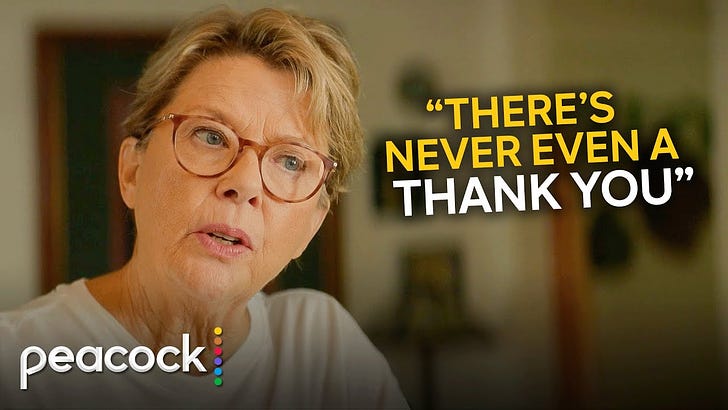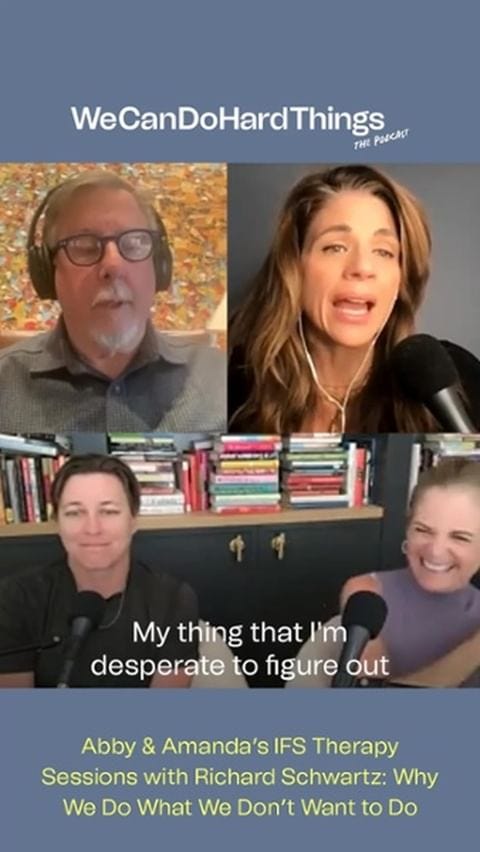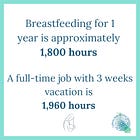Last week, Dr. Dick Schwartz, the founder of Internal Family Systems and author of No Bad Parts, was on the We Can Do Hard Things podcast. Whereas I used to listen to this podcast religiously, I’ve been a bit behind lately (can I blame it on divorce being a full time job?). But I knew I wanted to tune in to this one.
IFS has been a key part of my healing in the last year and a half. In fact, I’m not sure I’d have been able to leave my marriage if I hadn’t unblended from my Good Girl part. As a dutiful daughter and then evangelical Christian, being good was key to my identity. And in case you haven’t noticed, a good girl does not leave her marriage.
If you aren’t family with IFS, these podcasts with Dick Schwartz are a good starting point. They’ve also unpacked IFS with Dr. Becky and even did a mini-session with Martha Beck. But to have Schwartz on the podcast, and to walk Glennon, Abby, and Amanda through a session of connecting with their parts was pretty damn powerful. Each one of them marveled at how much insight came from just one ten-minute mini-session.
IFS can initially feel a little intimidating with all its terminology. There are parts and exiles, managers and firefighters, protectors and the Self. But let me do my best to give a Cliff Notes version.
IFS posits that we all have different parts that make up our internal structure, like different members of a family. Sometimes these parts oppose each other, like The Rebel and The Good Girl (in this podcast, Schwartz called this polarization). Sometimes parts get exiled, in other words, shut away if they do not get you what you want (which in childhood is namely love and acceptance). Certain parts can become dominant and begin to run the show. If they run the show too much, you can become blended with this part, which means this part thinks that it is you.
A key tenant of IFS is that none of these parts are bad. They are actually pretty adaptive. But sometimes we let parts that were necessary for our survival in childhood continue to be in charge even though we are no longer vulnerable, or need them, in the same ways.
While Glennon was the focus of the session, she envisioned these parts around a conference table. I often thought of my parts as being on a bus. Different parts would access the driver's seat at different times. Some parts had been relegated to the back of the bus for so long they weren’t even sure they knew how to drive anymore. Others had taken control of the wheel so often that they thought it was their rightful place.
These parts develop as coping strategies in childhood. They served you in various ways. Glennon is curious about the part of her that drives her eating disorder. What is key in parts work is you cannot go in to connect with the part with judgment. You must be open, curious, asking it what it needs, what it wants you to know.
I found it so interesting throughout the podcast with Glennon that Schwartz has to keep reminding her this isn’t intellectual work. She keeps saying “I think…” when she is about to report what her part is telling her. Schwartz keeps saying: “Don’t think! Just wait and see what comes.” It shows that to do this work we have to go underneath our intellectualizing and get into our body. To let our intuition and inner wisdom take over.
The goal of IFS is to get back in touch with Self. To be Self guided instead of run by all these unconscious parts of you. You connect with your parts to see what they have to tell you, let them know that you are not a child any more, and hopefully let them release their grip on the steering wheel so that your life can be led by your Self and not all these coping mechanisms.
Two of my prominent parts are The Good Girl and The Productive One (you might also call her The Overachiever). This part believes her value lies in what she can accomplish, thus she rarely sits down or allows herself rest, instead constantly working to cross things off an internal checklist. I’ve also identified a part of me that just keeps soldiering on no matter how difficult life gets. This part helped me return to college two weeks after the death of my father, and was essential during my early years of motherhood.
When I envision this part of me, I see a form who is carrying a heavy burden, eyes trained on the ground, continuously putting one foot in front of the other. She doesn’t have time to feel, play, or look up at the beauty surrounding her. In the soldiering state, I’m blocked from my body and my emotions, but I’m doing so much. I’m still productive so it looks like I’m thriving. But I’m dead inside, frozen, detached. Kind of a zombie.
I think The Solider also took over during the hardest days of my marriage. We are not taught as women how to leave. We are taught to stay, to endure, to stick it out. To soldier on. But at some point, shouldn’t the war be over?
I binged the show “Apples Never Fall” this week as my kids were with their dad. It’s streaming on Peacock and is based on a Liane Moriarty novel of the same name. It is a portrait of mid-life motherhood and marriage while wrapped in a missing persons case. There is a particularly poignant scene in the final episode where Joy unpacks what marriage and motherhood takes from a woman.
Her children are grown but harbor resentments about how she handled things in their upbringing. They are icing her out, punishing her for her choices, letting her calls go to voicemail, refusing invitations. Joy and her husband have recently retired and they are both chafing at the constraints of this new life, unsure of what the future holds without work to keep them occupied.
If you haven’t watched the series and hope to, skip this next paragraph (spoilers ahead!). But at the end of the show, Joy returns to the home and family. She’d just disappeared out of spite, in anger at how no one seemed to care, in frustration for feeling invisible. She feels bad for the chaos she caused. One of her daughters tries to emphasize how much they needed her. “Without you, we fell apart,” she says. Joy seems buoyed by someone finally saying what she’s felt all along. How much she is necessary. But as they go about picking up the mess left by a hurricane, and it seems clear that everything will go on as it was….she’ll stay married to Stan despite his douchiness, she’ll keep inviting her children over for dinners…a feeling welled up inside me. No, I wanted to scream at her. Go! You do not have to stay! You do not have to keep soldiering on! You’ll be so much happier if you leave Stan and find some condo on the beach, maybe some girlfriends to play cards with, a younger boyfriend to have some wild sex! I was desperate for her to hit the escape button, let this crisis move her forward into the next stage of her life, not keep her stuck in the status quo.
But society wants us to stay. Society wants us to soldier on, stick it out through the rough patches. Isn’t that what Michelle Obama was saying in those clips where she talked about how she couldn’t stand her husband for ten years?
What’s fascinating about IFS is I’m always identifying new parts. And to be clear, like Schwartz stresses (and even titled his book), there are no bad parts. Sometimes its beneficial to be The Good Girl. It’s often adaptive to be The Productive One. We all need a few phases as The Rebel. The Solider is necessary for times like finals, or to get through to the end of a big project, or even when a loved one is facing a tough diagnosis. But ideally, once the challenging time is over, you let some new parts try their hand at driving.
I’ve noticed, since living on my own for a year, that there is a part of me that had to be exiled in order to remain in my marriage. Perhaps I’ll call her The Sturdy One. She is capable and smart, unflappable and able to handle things on her own. I couldn’t access her in that relationship because if I did, I would have left. I would have walked away, knowing that he was unnecessary. Exiling her meant I protected the happily ever after I was so desperate for. But once that fairytale ended, it was like she was waiting in the wings for me to call on her. She’s got things handled. Everything is under control. I’m very glad to be able to lean on her as I go through this divorce process which is incredibly destabilizing. But she’s right there driving the bus, calm and collected, cool and competent. I love this part of me, and am so glad she’s finally taken her seat at the wheel.
Have you done IFS work? If so, what parts are most often driving your bus? Let us know in the comments!
Did you know that liking this post or leaving a comment helps it find more readers? If you are reading this as an email, there is a heart button at the top and bottom of this email. Click on it and it will take you to the Substack website where you can also leave a comment. If you are reading it online, again, just click the heart button at the top or bottom of this post. I appreciate your support so much!
GOING FURTHER
No Bad Parts: Healing Trauma and Restoring Wholeness with the Internal Family Systems Model, Richard C. Schwartz.
Inside an IFS Therapy Session with Glennon and Richard C. Schwartz, We Can Do Hard Things.
Abby & Amanda’s IFS Therapy Sessions with Richard C. Schwartz, We Can Do Hard Things.
Martha Beck Helps Amanda Let Go, We Can Do Hard Things.
The Most Radical Way to Heal: Internal Family Systems with Dr. Becky Kennedy, We Can Do Hard Things.








This piece is amazing, Cindy! IFS is such great work to do when on a healing path. It's kind of mind-boggling how many parts we each have and how they are all there to do a job and protect us throughout different times in our life. I also love that you talk about how women are expected to stay no matter what or no matter how they feel (gotta love The Patriarchy🙄). I also love that you had that reaction while watching "Apples Never Fall"--good for you! Such a great piece. Thank you for writing it!
I’ve been dipping my toes in IFS in a coaching program I’m in now. It’s fascinating, and I love how you describe your good girl part and the sturdy part. Those are both parts I have as well and I think they have played the same roles for me.